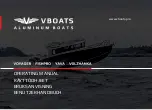
ASSEMBLY OF THE DRAGONFLY 32 SWING WING
WINGS:
First of all, mount the wings in respective places with the big pin bolts. The pin
bolts must be mounted with the thread down, and the nut secured with a Cleves
pin. Fold the wings out by holding the wings with a separate extra line diagonal
forward.
FLOATS:
Either lift up the float by hand (6 people) or better by fork lift, crane or similar.
When mounting the float to the wing
–
first place a washer and a nut on each
bolt inside the Wing. Then tig
hten the nut at each wing by the big “key” No 32
just so that the floats lie against the underside of the wing, not tight! You must
regularly look after and make sure that these are
always
tightened correctly.
Before you mount the float, check that the thread on the float bolt is ok by
installing a nut by hand only first, this can prevent big problems when installing
the float to the Wings. Make also sure the thread is clean and has no sand.
WATERSTAYS: (the big heavy-duty cable form the centre hull and up the Wings)
There are two long water stays for the forward wings and two short water stays
for the aft wings. Make sure the thread is clean and use appropriate grease. The
thread part of the water stay you turn into the big stainless steel fitting in the end
of the wing where the ama is mounted. Then you adjust the water stay so that
the water stay is well hand-
tight, it must not feel “loose”. The
water stays must
be checked regularly to make sure they have the correct tension and are free
from failures. Make sure that the threads are clean and have no sand grains. Use
special grease for stainless when installing. Only adjust the
water stay’s
when the
floats are folded approx. 75cm backwards.
(The floats must be fitted (installed) on land before adjusting the water stays).
After first season, the water stays normally need only one full extra turn.
IMPORTANT:
Water stays must be changed every 7 years or by max. 15,000 NM
of sailing.
ALWAYS assemble the boat on land. Never try and assembly or disassembly the
boat on the water.
Rigging on the mast itself (spreader and diamond cables) must be
changed/replaced by minimum every 15 years and or by max 20.000 NM.
Summary of Contents for 32 Swing Wing
Page 1: ...OWNER S MANUAL 32 Swing Wing ...
Page 7: ......
Page 8: ......
Page 9: ......
Page 10: ......
Page 11: ......
Page 12: ......
Page 29: ......
Page 52: ......
Page 53: ......
Page 55: ......
Page 58: ......
Page 59: ......
Page 60: ......
Page 61: ......
Page 62: ......
Page 63: ......
Page 64: ......
Page 65: ......
Page 78: ......
Page 79: ......
















































